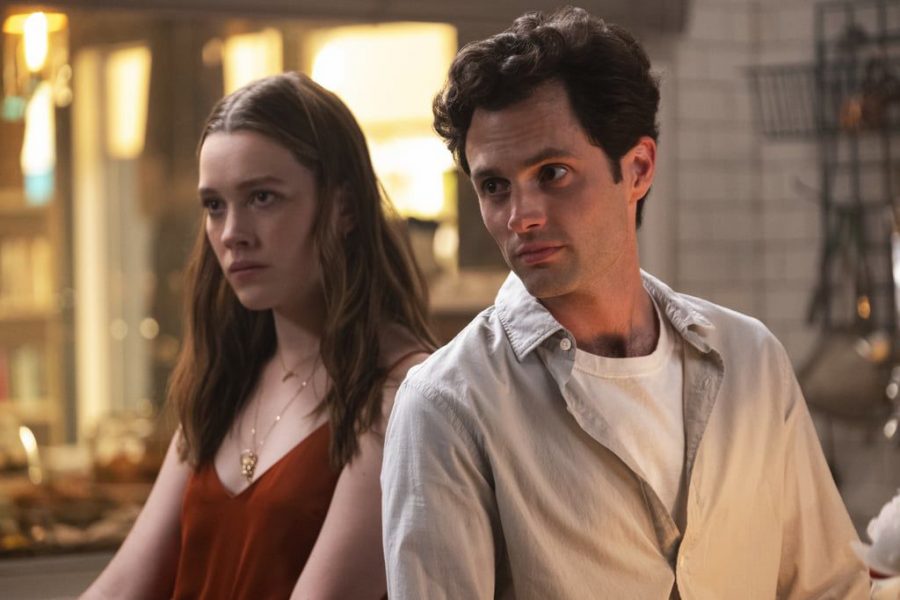Opinion: “You” tells a story of white man privilege – and how it helps you get away with murder.
February 18, 2020
This article contains spoilers
Raise your hand if you’ve been personally victimized by Netflix’s You. If you haven’t been non stop thinking about this show then you are either living under a rock or you don’t have Netflix (same thing in 2020 to be honest). You is a psychological thriller about a privileged white man named Joe who falls in love too fast and obviously doesn’t know how to have a healthy relationship with women, mother-issues aside. He has this habit of finding a girl, making eye contact for one second, and it ends with him thinking inside the box(if you’ve watched the show you’ll get the horrible attempt at a joke). Don’t forget the heavy doses of monologue that sounds like a horrible spoken poetry performance. All around psychopathic murder vibes; to be honest it gives me the heebie-jeebies.
Based on a novel of the same name by Caroline Kepnes, You season one came out on Lifetime then Netflix in 2018 and stars Penn Badgely of Gossip Girl fame, Once Upon A Time’s Elizabeth Lail, and Pretty Little Liars’ Shay Mitchell.
Beginning in season one, Badgley plays the charismatically-psychotic book connoisseur, Joe, who falls in love with Lail’s Guinevere Beck after she visits the bookstore he works at. Straight to the point, it doesn’t work out and the season ends with a few dead bodies…
Season two came out on December 26th, 2019 and it was immediately binged by everyone while they relaxed during their winter break. According to Dateline, over 54 million member households watched the second season within the first month. Even classes here at Oregon State University are discussing the popularity of You and assigning projects around it alongside other pop culture topics.
Season two finds Joe changing his name to Will and flying across the United States to sunny Los Angeles, where he moans and groans about how fake people are. Which is a bit hypocritical because he is pretending like he didn’t kill people back in New York and then changed his entire identity. But go off, Joe Will.
Will unconsciously/consciously attaches himself to his landlord’s teenage sister, Ellie. In season one, Joe took a boy named Paco under his wing because of the boy’s troubled home life. Ellie’s home life isn’t as harsh as Paco’s, but Will can’t help but check up on her throughout the show, trying to help her and often going at it with the best intentions, but it doesn’t work out that way all the time. This becomes one of the parts of Will’s story line where people find it in themselves to forgive him for what he does later on in the season.
Will sulks around Los Angeles whining like a pretentious snob when he walks into Anavrin, which is a high-scale grocery store with an in-house bookstore/café where he’s hired on the spot when the manager realizes how good he is at books. There’s also a part where Will is talking to the manager of Anavrin, Calvin and Will pulls out Crime and Punishment and Calvin asks him if [Will] had thought about working in a bookstore, commending his knowledge of books with the line: “I love it. You sound like such a… a reader”. Boom! Will/Joe is working at a bookstore just like he was always meant to do. In this same episode he meets the Quinn siblings — Forty and Love. What their parents were thinking I don’t know, but those are their birth names. Will instantly profiles Forty as a snob, but finds Love quirky and interesting, pursuing a relationship with her.
Will and Love’s relationship is a big part of the show, and we learn a lot about Love’s family and her own trauma from her mother and father that plays into why Love is the way she is and why she does what she does throughout the show. Let’s just say she’s a perfect match for Will.
The other story line is Will trying to metaphorically kill Joe off. And he’s a bit successful until his past comes back to haunt him. Dun, dun, dun! Will may be thriving in Los Angeles with a fabulously talented chef girlfriend, an interesting relationship with Forty, a protective relationship with Delilah and Ellie, but Joe’s psychopathic past keeps creeping up. First Guinevere Beck, then Candace Stone, both of Joe’s dead-to-me exes haunt Will all the way to Los Angeles. Because of their appearance, Will is pulled back to his past and we are pulled back and confronted by what he has done and the fact that he is still doing horrible things.
What You makes us acknowledge is how quick we are to forgive people who murder others if they look a certain way. In an interview with Stephen Colbert, Badgley is asked “why do you think it says about our society that people are attracted to this psychopath?” [https://youtu.be/yRQ5ntxnFaI?t=133] and his response is “it says something about how much we are willing to be patient and forgive someone who inhabits a body that looks something like mine, the color of my skin, my gender, these sorts of things, these sorts of privileges, and you know… And how much less willing to forgive people who don’t fit those boxes”. It’s fortunate for us that we have an actor who is not trying to sympathize with the character he is portraying. It pulls the audience back when Badgley makes these comments. We have to acknowledge the amount of times we have forgiven white bodies for things they do compared to bodies of color. Penn Badgely is a conventionally attractive, white, cisgender, male and he is portraying a man with the same privileges who also is able to live in two of the most expensive cities in the United States all on bookstore manager/clerk income. And Badgley is not letting us as a society be apologetic for Joe/Will or any white cis-man’s poor excuses for murdering people, fictional or not.
Beaver’s Digest’s podcast, Dam, That’s Deep continues this conversation on their season 2 premiere episode, linked here [http://www.orangemedianetwork.com/beavers_digest/podcasts/dam-that-s-deep-lgbtq-pride-in-greek-life-and/article_98785564-401d-11ea-acd9-4b6e9044dd85.html]
Image courtesy of Netflix






